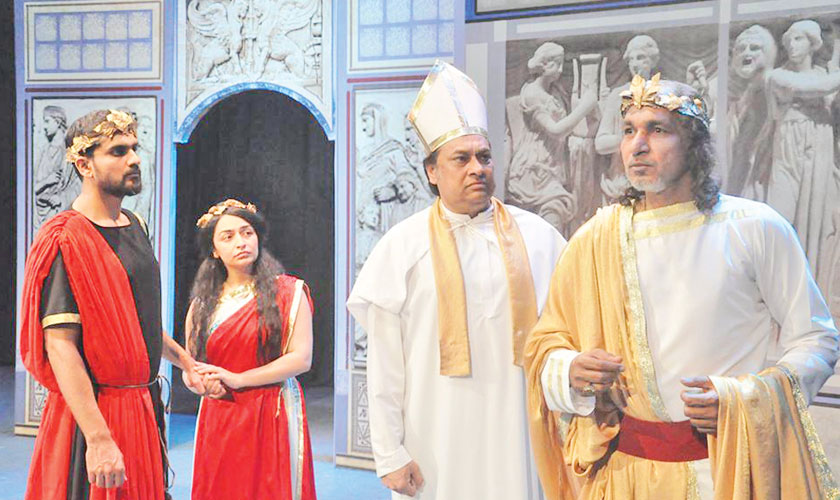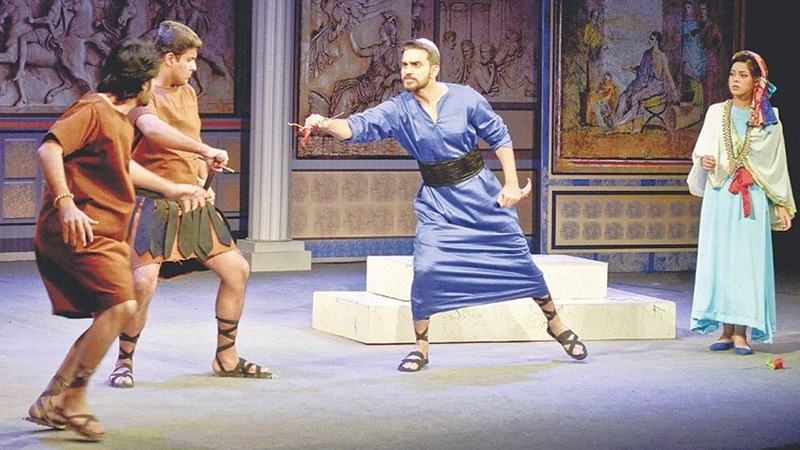Melodrama For All
The NAPA Repertory Theatre recently presented Agha Hashar’s Yehudi Ki Larki. Directed by veteran actor and director Khalid Ahmad, and boasting a cast comprising the only trained actors to be found in Pakistan, expectations were high. And NAPA did not disappoint.
Khalid Ahmad remained true to the spirit of Agha Hashar replicating the play faithfully as in the original with all its anachronisms and historical inaccuracies intact. There was no attempt at interpretation or catering to more sensitive modern sensibilities. Instead the play was rendered in the traditional style with Agha Hashar’s blend of melodrama, poetry, music and comedy serving up a no-holds barred theatrical experience. The aesthetically pleasing and professionally crafted sets and authentic costumes added greatly to the experience as did the live musicians and chorus.
Agha Hashar Kashmiri is one of the leading name in the brief history of Urdu theatre. He is often referred to as the Shakespeare of Urdu theatre and, in fact, his early works were adaptations of Shakespearean plays. Agha Hashar uses the rhyming couplets and comic interludes immortalized by the Elizabethan bard, but in the tradition of Parsi theatre which was itself replete with songs and comedy. Interestingly, the comic interludes have nothing to do with the main plot. The comedy scenes abruptly shift to a completely different place and time, the purpose of which is simply to provide a few laughs. The comic relief is often interspersed even as the melodrama of the main story is reaching a peak. So a fraught with tension trial scene in Yehudi ki Larki is suddenly interrupted by a nonsensical charade about cheating husbands and wives.
The main story is set at a time when the Jews are living a life of subjugation and persecution under the Romans. One particularly outspoken old Jew, who has on more than one occasion incurred the wrath of the religious head of the Romans, has a beautiful daughter who catches the eye of the Roman prince. Truly smitten, he poses as a young Jew to win her love and trust. Eventually, of course, the truth must be revealed and all matter of complications follow.
Fawad Khan, who plays the Roman prince, Marcus, is becoming more and more confident as a performer and whether it is film or storytelling or theatre, he commands audience attention. Kaif Ghaznavi, of television drama fame, is the Roman princess, Deesia, who is suffering the pangs of unrequited love for Marcus. Kaif also put in a polished performance as the soft-hearted princess. At the play’s denouement, she even surprised audiences with a melodiously rendered song and a few equally graceful dance moves.
Maria Saad Faridi plays the beauteous Yehudi ki Larki of the title and was competent, if unremarkable in her role. She becomes more interesting as her character takes a slightly negative turn as the play progresses. Nazrul Hassan, as the ageing but still fiery old Jew, Ezra, brought the requisite over-the- top emotional melodrama to his impassioned speeches on behalf of his people. Akbar Islam plays the religious head, who like many of his ilk in all ages, is a cruel and intolerant man under the guise of righteousness.
Trained as they are by some of the most respected names in the field, the NAPA actors deliver their lines with a clarity and confidence that sets them apart. The comic interludes, were perhaps one too many, but then one would have to argue with Agha Hashar for that. The comedy is slapstick at best but executed with good comic timing and aplomb, elicited laughter despite oneself.
Any society would be lucky to have an abundance of theatre and a variety of it. In that, NAPA is playing a leading role and deserves credit for bringing to life such classic gems which are a part of our cultural history.
Zahra Chughtai has worked and written for Pakistan's leading publications including Newsline, the Herald and Dawn. She continues to write freelance.





